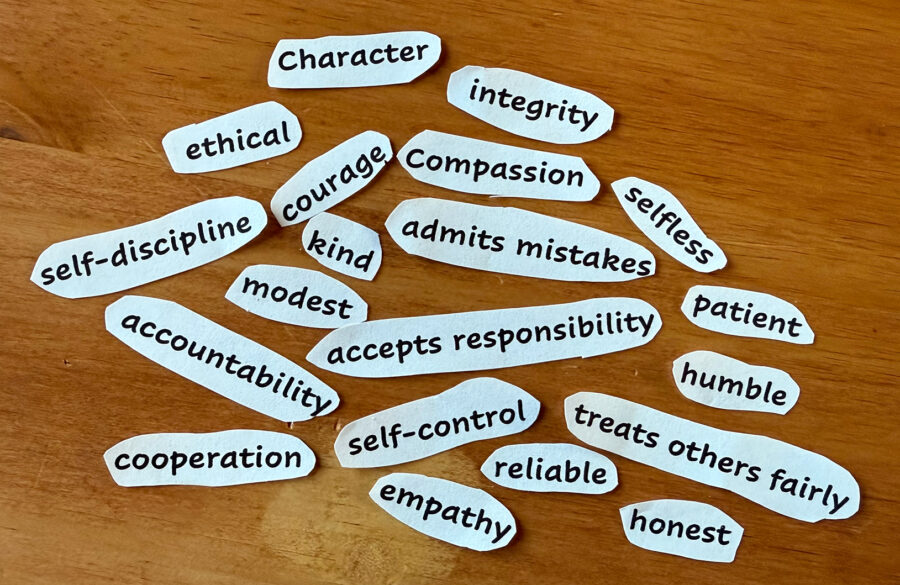Character matters. My parents taught me this—not through words, but by their actions. Our family did not talk a lot. Mealtimes were for eating and other times were reserved for work or relaxation. It seemed to never occur to my family to have discussions. However, by watching how my parents interacted with people, it was evident that character and compassion were important.
The purpose of life is not to be happy. It is to be useful, to be honorable, to be compassionate, to have it make some difference that you have lived, and lived well.
— Ralph Waldo Emerson (1803-1882) American essayist, lecturer, philosopher,
minister, abolitionist, and poet
My mother always checked on family or friends who were sick or needing anything. She would go stay with them in the hospital and make sure they were comfortable. Sometimes she would go buy things people needed. I remember she bought dentures for someone who could not afford them—and that is only one example out of many. Our extended family immediately called my mother if anything was wrong. Her friends called her for advice—which was always given with thought and compassion. She taught typing at a business college where she coached young women (and some men) how to work with dignity and integrity in an office setting. Character mattered to her and she sought to instill that in those in her care—whether it be her children or other young people.

My father owned a truck parts business. He was honest and forthright in his dealings. Often, some of the drivers who came into his shop were down on their luck. My father, always generous and compassionate, would help them out. He labored long hours, but he never grumbled about the work or the people.
One of the things I remember most about him was the few things he said about his time in World War II. He spent four years—February 1942 until September 1945 (from age twenty-four to twenty-eight)—in World War II. He was an ambulance driver during the war but shared very few stories from those years. What he did share was that he also drove the commanders and generals around sometimes—often, to their bars or canteens where they hung out. They would let my father come in as well. He mentioned some of their names—Gen. Gavin, Maj. Gen. Ridgway, Maj. Gen. Bradley, and Col. Tucker. He recalled them with respect and fondness. I could tell he thought these were men of character and courage—and compassion.
What Does Character Mean?
What does “character” mean? Simply defined, character is the way someone thinks, feels, and behaves. It is fundamental to how we engage with the world. Character is the mental and moral qualities that are distinctive to a person. Martin Luther King Jr. once said, “Intelligence plus character—that is the goal of true education.” He also stated he looked forward to the day when all Americans would be judged solely “by the content of their character”—a person’s essential qualities.
Character includes moral or ethical actions—along with honesty, courage, integrity, kindness, and compassion. Having good character is thinking, saying, and doing the right thing. People who possess good character demonstrate ethical judgment, trustworthy actions, self-control and accountability for their decisions.
Watch your thoughts, they become words; watch your words, they become actions; watch your actions, they become habits; watch your habits, they become character; watch your character, for it becomes your destiny.
— Frank Outlaw, American businessperson and retailing executive
What Does Compassion Mean?
Compassion is feeling motivated to relieve the pain or suffering of others when you are confronted with their distress. It is different from empathy in that empathy is the ability to relate to another person’s pain as if it were your own. But empathy does not imply taking action. Compassion originates from the latin compati, meaning to see the suffering of others and take action to stop it.
In my view, the best of humanity is in our exercise of empathy and compassion. It’s when we challenge ourselves to walk in the shoes of someone whose pain or plight might seem so different than yours that it’s almost incomprehensible.
— Sarah McBride (b. 1990) American activist and politician
Gen. Matthew Bunker Ridgway
When I was doing research on the names my father mentioned from World War II, I found Matthew Bunker Ridgway (1895-1993) particularly interesting. During his career, he was recognized as an outstanding leader who earned the respect of subordinates, peers, and superiors.
Although he saw no combat service in World War I, he was intensively involved in World War II, where he was the first Commanding General (CG) of the 82nd Airborne Division, leading it in action in Sicily, Italy and Normandy, before taking command of the newly formed XVIII Airborne Corps in August 1944. He held the latter post until the end of the war in mid-1945, commanding the corps in the Battle of the Bulge, Operation Varsity and the Western Allied invasion of Germany. He was a senior officer in the United States Army, who served as Supreme Allied Commander Europe (1952-1953) and the 19th Chief of Staff of the United States Army (1953-1955).
Matthew B. Ridgway was a significant figure in United States history. Besides that listed above, he succeeded MacArthur in Korea; he was the U.S. delegate to the United Nations; he served as Supreme Commander of the Far East and Supreme Commander in Europe. He was counselor to four presidents, helped found a university research center on national security, and was a powerful influence in national affairs for forty years. General Omar Bradley described Ridgway’s work turning the tide of the Korean War as “the greatest feat of personal leadership in the history of the Army.”
Biographer, George Charles Mitchell, says this in his book, Matthew B. Ridgway: soldier, statesman, scholar, citizen:
Ridgway considered leadership to have three primary ingredients: character, courage, and competence. He described character—including self-discipline, loyalty, selflessness, modesty, and willingness to accept responsibility and admit mistakes—as the “bedrock on which the whole edifice of leadership rests”. His concept of courage included both physical and moral courage. Competence included physical fitness, anticipating when crises will occur and being present to resolve them, and being close to subordinates—communicating clearly and ensuring that they are treated and led well and fairly.
Necessities, Not Options
Character matters. Compassion matters. Honesty, courage, integrity, and kindness are essential. These traits guide how we live in the world, make decisions, and treat other people. Demonstrating character and compassion are my gauge for judging my actions as well as others.
Human greatness does not lie in wealth or power, but in character and goodness.
People are just people, and all people have faults and shortcomings,
but all of us are born with a basic goodness.
— Anne Frank (1929-1945) German-born Jewish girl who kept a diary documenting her life in hiding amid Nazi persecution during the German occupation of the Netherlands.
Love and compassion are necessities, not luxuries. Without them humanity cannot survive.
— Dalai Lama (b. 1935) The highest spiritual leader and head of Tibetan Buddhism
The purpose of human life is to serve, and to show compassion and the will to help others.
— Albert Schweitzer (1875-1965) German and French polymath from Alsace, theologian, organist, musicologist, writer, humanitarian, philosopher, and physician










Leave a Reply
Your email is safe with us.